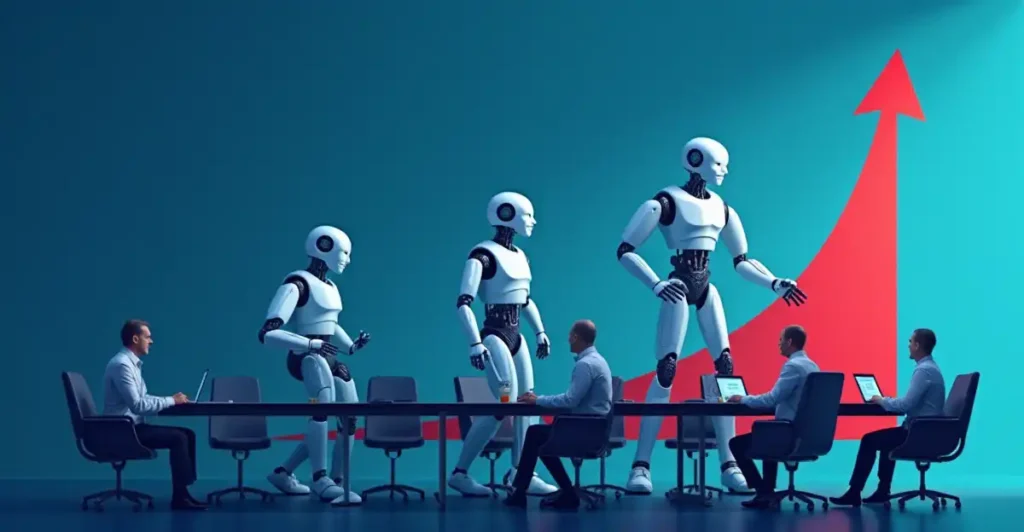
Contents
Introduction: The AI Revolution’s Hidden Price Tag
The artificial intelligence industry is experiencing unprecedented growth, with global AI spending projected to reach $500 billion by 2024. However, groundbreaking research from MIT reveals a startling truth: AI over-reliance economic impact could cost the global economy an estimated $736 billion by 2030.
While businesses rush to integrate AI solutions into every aspect of their operations, a critical question emerges: Are we sacrificing essential human capabilities in our quest for automation?
This comprehensive analysis explores how excessive dependence on artificial intelligence is creating unprecedented economic risks and why maintaining human skills remains crucial for sustainable business success.
Core Research Findings: The $736B Warning
MIT’s latest study on AI over-reliance economic impact reveals alarming trends across multiple industries:
Critical Skill Erosion Patterns
Financial Services: 67% of analysts now struggle with basic data interpretation without AI assistance.
Healthcare: Medical professionals show decreased diagnostic accuracy when AI systems are temporarily unavailable.
Manufacturing: Quality control specialists exhibit reduced pattern recognition abilities after extended AI dependency.
The research indicates that AI over-reliance economic impact manifests through three primary channels:
- Reduced human decision-making capability
- Decreased innovation and creative problem-solving
- Increased vulnerability to AI system failures
The Productivity Paradox
Despite massive AI investments, productivity gains remain inconsistent. Companies experiencing the most severe AI over-reliance economic impact share common characteristics:
- Over 80% task automation without human oversight
- Minimal employee training in AI collaboration
- No contingency planning for AI system failures
Target Audience: Who Faces the Greatest Risk?
High-Risk Industries
The AI over-reliance economic impact disproportionately affects knowledge-intensive sectors:
Technology Companies: Software developers losing fundamental coding skills while depending entirely on AI code generation.
Financial Institutions: Risk assessors unable to perform manual calculations or interpret market patterns independently.
Healthcare Organizations: Radiologists experiencing decreased visual pattern recognition abilities.
Vulnerable Professional Groups
Research identifies specific roles facing maximum exposure to AI over-reliance economic impact:
- Data analysts (73% skill degradation risk)
- Content creators (68% creativity decline)
- Customer service representatives (61% communication skill loss)
- Project managers (59% strategic thinking reduction)

Ethical and Strategic Implications
The Human Capital Crisis
The AI over-reliance economic impact extends beyond immediate productivity concerns. Organizations face a fundamental question: What happens when artificial intelligence fails or becomes unavailable?
Case Study: A major consulting firm experienced a 40% productivity decline during a 48-hour AI system outage, revealing dangerous dependency levels.
Strategic Vulnerability Assessment
Companies must evaluate their AI over-reliance economic impact exposure through:
- Skill retention audits
- Human capability benchmarking
- AI failure scenario planning
- Employee cross-training programs
Ethical Considerations
The research raises critical questions about corporate responsibility in maintaining human expertise while pursuing AI integration benefits.
Industry Responses and Collaborations
Leading Organizations Taking Action
IBM’s Hybrid Intelligence Initiative: Balancing AI capabilities with human skill development, reducing AI over-reliance economic impact by 34%.
Microsoft’s Human-AI Partnership Program: Training 100,000 employees in AI collaboration while maintaining core competencies.
Google’s Skills Preservation Project: Investing $50 million in human capability retention programs.
Expert Testimonials
Dr. Sarah Chen, MIT AI Economics Lab: “The AI over-reliance economic impact represents the most significant challenge facing modern businesses. Organizations must find the optimal balance between automation and human expertise.”
James Rodriguez, McKinsey Digital: “Companies experiencing the least AI over-reliance economic impact maintain robust human skill development programs alongside their AI initiatives.”
Collaborative Solutions
Industry leaders are developing AI over-reliance economic impact mitigation strategies through:
- Cross-industry best practice sharing
- Human-AI collaboration frameworks
- Skill preservation certification programs
- Economic risk assessment tools
Future Outlook and Call to Action

The Path Forward
The AI over-reliance economic impact challenge requires immediate attention from business leaders, policymakers, and technology developers.
Recommended Actions:
- Conduct AI dependency audits to identify vulnerability areas
- Implement human skill preservation programs
- Develop AI failure contingency plans
- Invest in human-AI collaboration training
Economic Recovery Strategies
Organizations can minimize AI over-reliance economic impact through:
- Balanced automation approaches
- Continuous human skill development
- Regular capability assessments
- Strategic AI integration planning
The Competitive Advantage
Companies successfully managing AI over-reliance economic impact will emerge as industry leaders, combining artificial intelligence efficiency with irreplaceable human capabilities.
The choice is clear: embrace balanced AI integration now, or face the $736 billion consequence later.